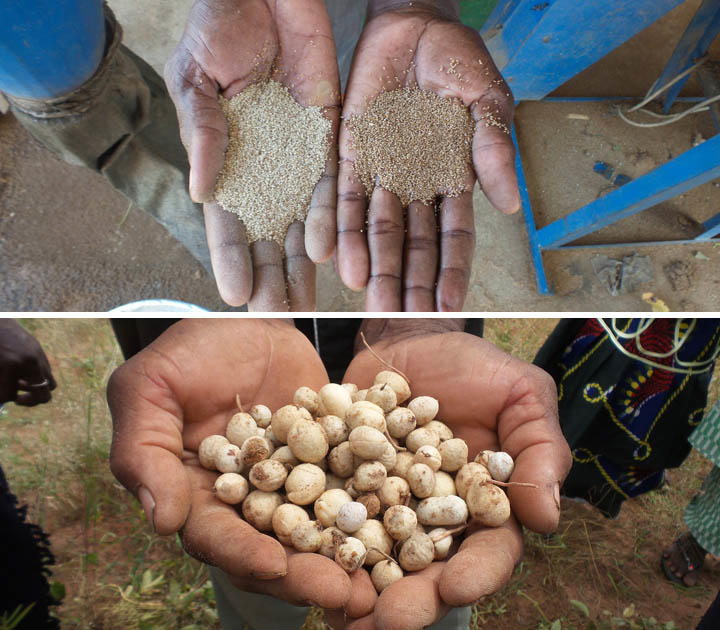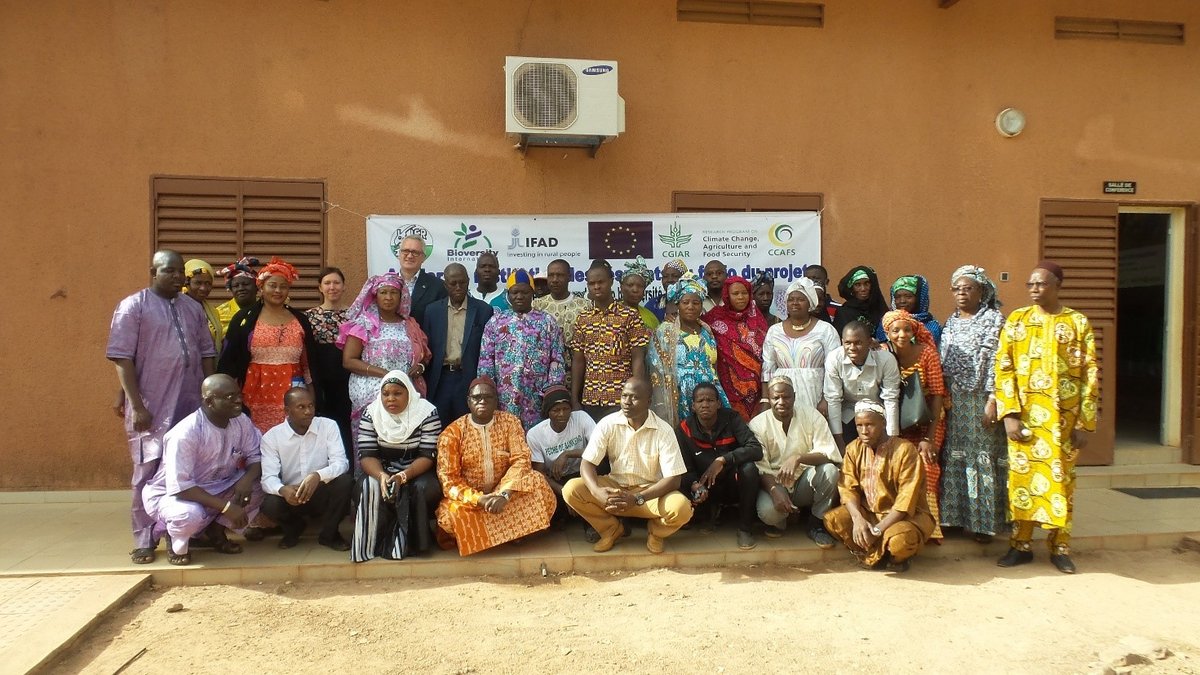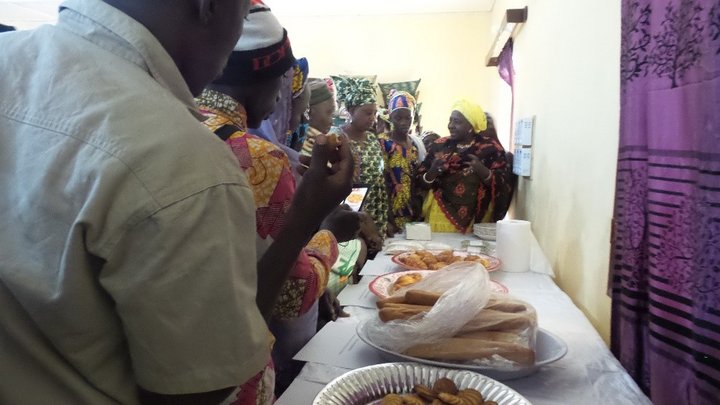Shaking up markets and narratives for increased consumption of nutritious fonio and Bambara groundnut

Effective value chains can increase the presence of a crop in markets and enable farmers to earn reliable incomes, which encourages continued production and supply. Gaia Lochetti, Research Fellow, 'Healthy diets from Sustainable Food Systems' research initiative, reports from Mali where she took part in stakeholder meetings about increasing the supply and demand for fonio and Bambara groundnut.
Value chains play a fundamental role for the diffusion and promotion of crop species. Effective value chains can increase the presence of a crop in markets and enable farmers to earn reliable incomes, which encourages continued production and supply. The value chains for many crops are unfortunately poorly developed, which limits their potential to benefit farmers and consumers.
This is the case for fonio (Digitaria exilis) and Bambara groundnut (Vigna subterranea), both native crops of West Africa that are well adapted to the climate of Sahel. Fonio may be the oldest cereal cultivated in Africa, while Bambara groundnut is a protein rich crop that was largely displaced from West African production systems when peanut was introduced from the Americas. Compared to other crops, these species require fewer external inputs and provide a greater quantity of essential nutrients and minerals, fundamental for people’s health.
Weak value chain development is partly a result of the narrow focus of agricultural research and development, which has neglected many local crops important in traditional food systems. Overcoming weaknesses in marketing these crops requires attention to enhance their processing, trading, marketing and retailing, which can in turn help leverage their benefits for strengthening food security, alleviating poverty, and increasing the resilience and sustainability of farming systems in face of climate change.
Bioversity International and the Institute of Rural Economy (IER) have been working to promote value chain development of fonio and Bambara groundnut in Mali through 'Linking agrobiodiversity value chains, climate adaptation and nutrition: Empowering the poor to manage risk', a project funded by the International Fund for Agricultural Development (IFAD) and the European Commission that is currently in its fourth and final year of implementation. Detailed value chain assessments were carried out in 2017 by Charlie Mbosso, Market and Gender Specialist, Bioversity International.
This March, stakeholders identified along the value chains were invited to crop-specific meetings to share back results of the value chain studies and discuss ways forward to overcome challenges for production, marketing and consumption of these crops.
More than a hundred stakeholders – such as farmers, traders, restaurateurs, journalists and representatives from NGOs, government bodies, farmer’s groups and cooperatives – took part in these meetings. They engaged in stimulating, and at times passionate, discussions on how to increase consumers’ demand and improve cultivation of fonio and Bambara groundnut in Mali. The groups were challenged to develop innovative solutions to the identified bottlenecks.
Each crop presents peculiar challenges and opportunities: a message that clearly emerged during the meetings. In the case of fonio, harvesting and especially processing are time-consuming and problematic. Cleaning and sand removal are complicated by the small dimensions of fonio grains, which need to undergo long processing. The cleaned and polished fonio – while more attractive to consumers – is however poorer in micronutrients and dietary fibre due to the removal of the outer part of the cereal. Small producers also face difficulties in linking to a disorganized market. The price farmers receive is too low to motivate them to produce and sell fonio, while the final price is too high for most consumers to access processed fonio.

Technological solutions for improving processing efficiency and quality is one important way forward to bridge this gap. It was noted, however, that processing machines are already available in the project areas. Better organization among producers would enable them to transport fonio to these centres. Some resourceful, empowered stakeholders present at the meeting have organized to better coordinate production for export in neighbouring countries such as Burkina Faso and Guinea. Their experience, which needs to be further investigated, could be leveraged to empower other women of the value chain.
Compared to fonio, the value chain of Bambara groundnut seems to be much less developed. This crop is mostly considered a 'nourriture de soudure': a product that is consumed in times of need and by the poorest. It is also consumed by many as a snack that is roasted and sold at small local markets.
Small yields and long cooking times are the main challenges for producers and consumers of Bambara groundnut that need to be addressed to promote greater use of this crop. Charlie Mbosso suggested that boiled Bambara groundnut could be developed by processing groups to supply to urban markets, a product that has had success in Ghana. In the case of Bambara groundnut, its consumption is particularly affected by social stigma – it is seen as a food for the poor –; this narrative needs to be challenged in order to promote greater use of this nutritious crop.
In order to lead by example, the lunch at each stakeholder meeting included an assortment of dishes prepared with Bambara groundnut, fonio and local vegetables. The recipes developed by Yara Koreissi, Food and Nutrition Technologist, IER, included Bambara groundnut couscous with amaranth leaves, Bambara groundnut soup with vegetables, bread, cookies and madeleines, which were prepared with a mix of wheat and fonio or Bambara groundnut flour and other nutritious delicacies.
Women and men alike enjoyed the dishes presented and recognized the importance of these crops in their diet. This was especially promising given that these meals can be easily replicated at home after a short training. The attendees discussed the potential for commercialisation of these recipes in local markets to enhance their marketing and empower women involved in trading activities.

The involvement of diverse stakeholders in these meetings strengthened the exchange of knowledge and the understanding of value chain dynamics. The engagement of different actors in the value chains of fonio and Bambara groundnut increased determination to cooperate to reach common objectives. The inputs and observations from the meetings have been taken in account and will shape the activities planned for the last year of the IFAD-EU NUS project.
Fact sheets on the value chain studies and presentations from the stakeholder workshops can be downloaded below.
Learn more about the activities of this project in Mali and take a look at photos from the field.
Visit http://nuscommunity.org/ in the coming weeks to download the proceedings which are under preparation.
This research was carried out in the context of the project 'Linking agrobiodiversity value chains, climate adaptation and nutrition: Empowering the poor to manage risk' supported by the International Fund for Agricultural Development (IFAD), the European Commission, and the CGIAR Research Programs on Climate Change, Agriculture and Food Security (CCAFS) and Agriculture for Nutrition and Health (A4NH).
Related documents
Fonio
- Research brief: Value chain and market potential of fonio to strengthen climate resilience, food security and women’s incomes in Mali (Mbosso et al 2018)
- Présentation et résultats de l’étude la chaine de valeur du fonio (Digitaria sp.) dans les régions de Ségou et Sikasso au Mali(Charlie Mbosso, Bioversity International, and Niang Aminatha Berthe, IER)
Bambara groundnut
- Research brief: Value chain and market potential of Bambara groundnut to strengthen climate resilience, food security and women’s incomes in Mali (Mbosso et al 2018)
- Présentation et résultats de l’étude la chaine de valeur du voandzou (Vigna subterranea) dans les régions de Ségou et Sikasso au Mali (Charlie Mbosso, Bioversity International, and Niang Aminatha Berthe, IER)
Fonio
- Research brief: Value chain and market potential of fonio to strengthen climate resilience, food security and women’s incomes in Mali (Mbosso et al 2018)
- Présentation et résultats de l’étude la chaine de valeur du fonio (Digitaria sp.) dans les régions de Ségou et Sikasso au Mali(Charlie Mbosso, Bioversity International, and Niang Aminatha Berthe, IER)
Bambara groundnut
- Research brief: Value chain and market potential of Bambara groundnut to strengthen climate resilience, food security and women’s incomes in Mali (Mbosso et al 2018)
- Présentation et résultats de l’étude la chaine de valeur du voandzou (Vigna subterranea) dans les régions de Ségou et Sikasso au Mali (Charlie Mbosso, Bioversity International, and Niang Aminatha Berthe, IER)
